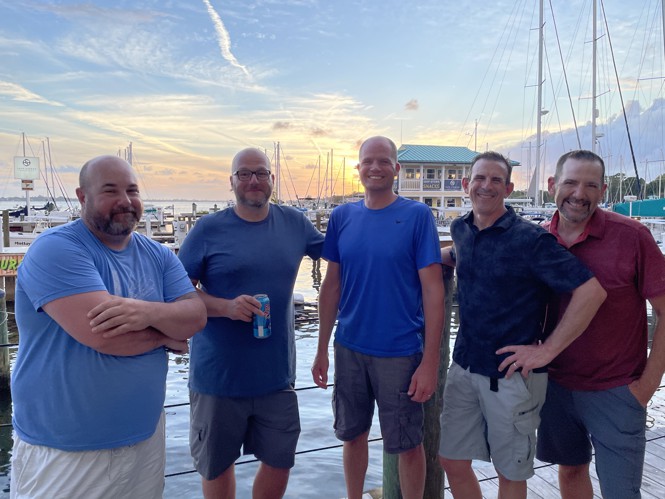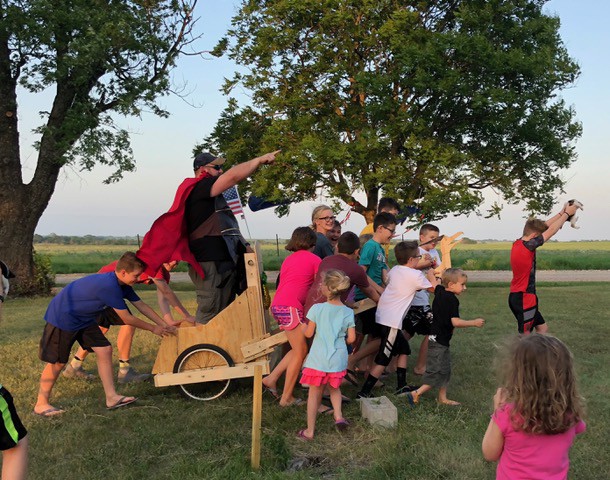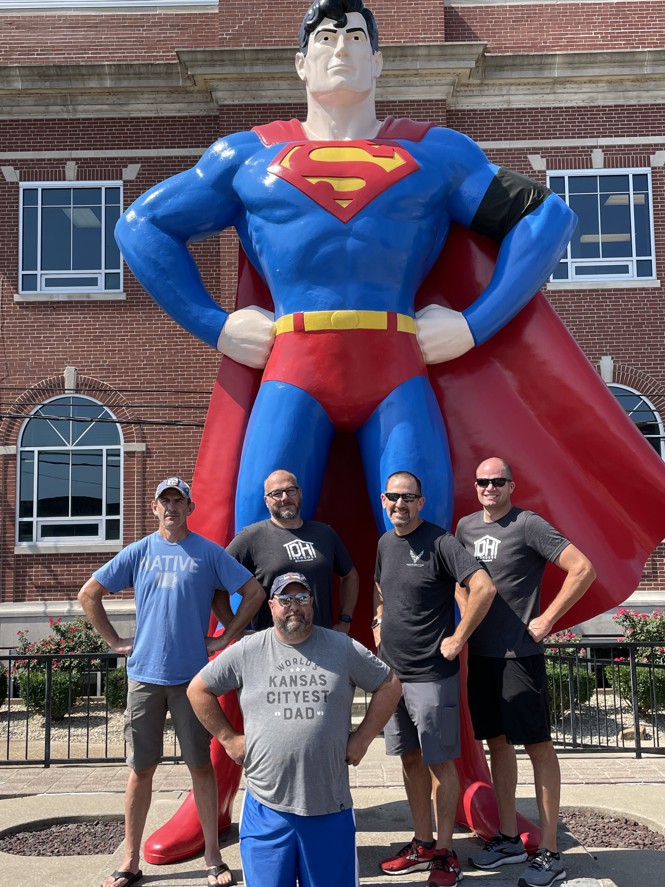The Stay-at-Home Dads Who Don’t Stay Home
Each installment of “The Friendship Files” features a conversation between The Atlantic’s Julie Beck and two or more friends, exploring the history and significance of their relationship.
This week she talks with a group of stay-at-home dads who met at a local fathers’ group. Their wives and kids have become friends too, and now the five families spend most weekends together, take group vacations, and share the load of parenting the 16 kids they have between them. They discuss the maddeningly low expectations society has for fathers, how their friendship built up their confidence as parents, and the adventures they’ve shared.
The Friends:
Mike Bowling, 45, a stay-at-home dad and videographer who lives in Shawnee, Kansas
Larry Broxterman, 46, a stay-at-home dad and entrepreneur who lives in Bonner Springs, Kansas
Shannon Carpenter, 47, a stay-at-home dad and the author of The Ultimate Stay-at-Home Dad, who lives in Lee’s Summit, Missouri
Mick Freyermuth, 50, a stay-at-home dad who lives in Kansas City, Missouri
Jake Knapitsch, 41, a stay-at-home dad and woodworker who lives in Lenexa, Kansas
This interview has been edited for length and clarity.
Julie Beck: Tell me how you found each other.
Mick Freyermuth: We all met through KC Dads, a Kansas City Metro–wide group for stay-at-home dads. We would go to playgroups together, or go on adventures—to library story hour or a Civil War battlefield.
Our kids became friends, and we became friends. We introduced the wives to each other, and they became friends. So now you’ve got the trifecta. We’ve been friends for over 14 years because of this.
[Read: What Ruth Bader Ginsburg taught me about being a stay-at-home dad]
Shannon Carpenter: I showed up at the first playgroup because I was lonely, man. I was lonely and isolated, and I couldn’t join a moms’ group, and people were giving me weirdo stares on the playground. Before I knew it, Mick was taking care of my youngest child while I went to the bathroom. I come back, and he’s feeding him Cheerios. I was like, “This is bitching. This is what I need.”

Beck: What were the dads’ group meetings like?
Jake Knapitsch: In the beginning, it was a scheduled playdate at someone’s house. You’d go, let your kids play, and chat with the other dads about adulting things.
Shannon: It grew from there. That once-a-week playgroup just wasn’t enough. I enjoyed being around those guys, and I don’t like staying home, even though the term is stay-at-home dad. So I started taking the kids on adventures. Goofy crap—Civil War battlefields and things like that. Then Mick found out and got mad that I didn’t invite him. Then Jake found out, and he got a little cranky. So we started doing Adventure Friday. Sometimes it would just be the library. But a lot of times it’d be things that we wanted to see. We went to the Jesse James bank-robbery museum.
Mick: There’s no rule that says you have to do kid-centric things when you’re parenting your child. Your kids just want to be a part of your life. They want attention. They want to have fun with you. And kids can have a lot of fun on a Civil War battlefield, running around, picking flowers while you’re reading the historical markers and learning something.
Shannon: One of the big first adventures we did was the Missouri State Fair. There were six or seven of us with our strollers and our kids. All of a sudden, I wasn’t getting looked at like I was weird. People were talking to us.
Mike Bowling: It was way more comfortable being in that group. You weren’t just out there by yourself. You had a wall of guys with you, all pushing strollers.

Jake: A bunch of other guys in the group came and went, but the five of us just clicked and continued doing all these things. Our wives also clicked, so we had excuses to have big group get-togethers. The kids have grown up together.
Beck: You’ve made a couple of allusions to people giving you weird looks. Do you feel like you’ve faced assumptions from people because you’re a stay-at-home dad?
Mick: This is such a loaded question for us, as males in the primary-caregiver world. Traditionally, we get a standing ovation if we just can change a diaper.
Jake: You don’t even have to do that. They can be covered in poop. As long as they survive, you get a standing ovation.
Mick: If we show up to the game and look like we’re trying to accomplish something, we get the “Atta boy.” We get the “Look at that dad; he’s doing great.”
Jake: “Giving Mom the day off.”
Shannon: All of us have heard “Are you babysitting today?” Which bugs the shit out of us. And “Are you helping Mom?” We don’t help Mom. We parent.
Mick: We’ve heard all the stereotypes, but we’re the primary caregivers. We’re professional. We made the conscious choice to parent our kids, and we take it seriously. It’s been hard when that has not been acknowledged or accepted, because dads are just as capable of raising kids as moms. We all have our strengths. We all have our weaknesses. We’ve developed the mentality of “We’re going to have fun raising our kids,” so we don’t let it faze us much. But it’s in the background. It’s always there.
Shannon: It is really hard for a dad to go to a playground and not be seen as a threat. Guys in the group have been yelled at just for being there. When I go to a story time, no one sits near me. Alone, you’re either the hero or the predator. When you’re in a group, it’s not like that.
We have each other’s support. That makes a difference in my confidence. There was a time, before I joined the group, where I had no confidence at all.
Larry Broxterman: As you grow as a parent, your own confidence grows with that. Then you help the ones that are just starting out. That’s what the group has done for all of us.
Mike: We’re still leaning on each other now, when half of our kids are teenagers. We’re still learning.
Mick: It’s not just that we have each other’s support. Our wives are 100 percent behind this flip of gender roles. We are our wives’ biggest fans. And our wives are our biggest fans.
Shannon: We also get the question “Is it emasculating?” We ignore it. I mean, we can build a deck or bake you a cake. It doesn’t matter, it’s not gender-based.
Beck: Do you have standout memories of milestones or parenting challenges where this group really helped you?
Mick: Because we’re comfortable with each other, our kids are always comfortable with these other guys as role models and authority figures. Sometimes these guys can say things to my kids that I can’t, or teach them something that I can’t. Larry taught my son to ride a bicycle, because it wasn’t clicking when I did it.
Mike: Nobody has any problem with yelling at somebody else’s kids, to say, “Stop hitting so and so,” or “Stop screwing around.” The kids are used to it.
Shannon: This is the best example of having support: I got my book deal on a Friday. And on Saturday, my brother-in-law died. He happened to be one of my best friends. On Monday I decided we should go on a Dads’ Trip. We do it every year, just the five of us and all the kids. We pick a direction and go. I needed to be around my dads because I didn’t know how to deal with everything coming at me. I can’t have the highest high and lowest low at the same time. It was too much.
We ended up in Iowa during the great migration of butterflies. We were rolling through fields of butterflies. My kids were freaking out, laughing.
Then we stopped at a gas station because my van started smoking. It just overwhelmed me; I broke down, I started laughing hysterically. I didn’t even have to ask, and Jake’s already got the hood open, and Larry’s messing with the battery. And Mick’s taking care of my kids. These four guys took care of me without me asking.
[Read: These two generations of best friends live like family]
Beck: I’m going to throw a deep one at you: What are your thoughts on the nuclear family? It seems like you guys are really raising your kids in a broader community.
Mick: I don’t even know what a nuclear family is anymore. We’re constantly sending videos or pictures to Grandma and Grandpa, to the cousins. My kids have got their school friends and their playgroup friends. I don’t have a nuclear family. I’ve got a community.
Shannon: Family is what you make of it. The traditional model of mom, dad, 2.5 kids is outdated. I moved from Texas to Kansas City, so I have no family up here. Mick is the emergency contact for most of my kids. No matter what your family is made up of, the most important job is to offer love and a supporting environment. However that looks.

Larry: We mostly deal with discipline within our core nuclear family. But we raise our kids with the community. Shoot, in the last two months, we’ve spent what? Five or six weekends together. I wouldn’t have it any other way.
Beck: Can you tell me about the origin of Dads’ Trip and where you guys have traveled?
Shannon: I used to get asked what do I do all day? Once, as a joke, I said, “Oh, we go to see the world’s biggest ball of twine.” And the person I was talking to said, “Oh, you go to Cawker City? That’s a real thing; it’s three hours away.” I was like, “Oh my God, I have to see this.”
[Read: Twisted: The battle to be the world’s largest ball of twine]
My daughter was about to start kindergarten. I panicked a little bit and thought, Maybe I didn’t get enough time with her. So me and another dad packed up a van, drove three hours, and saw the world’s biggest ball of twine. That started it. The next year, we went and saw a huge coal shovel called Big Brutus, which is in south Kansas.
Beck: Is the destination always a large object?
Mick: Definitely roadside attractions.
Jake: We’ve done museums, and we’ve seen Abraham Lincoln’s childhood home. But it is kitschy, roadside stuff.
Mick: We try to have a destination, a turnaround point. And then we fill in whatever neat stuff we can find along the way. We have the running joke that if it is the world’s biggest anything, we’ll go see it.
Shannon: We played baseball on the Field of Dreams with our kids. On the actual goddamn field. I started inviting anybody who came that day to play with us. Two ladies told me they were sisters, and I said, “Who’s older?” And they said, “No, we’re nuns. We’re those kind of sisters.” So we played baseball on the Field of Dreams with nuns.
Mike: Obviously we eat out on the road. We show up to restaurants with 21 of us. We usually call ahead to make sure they’ve got space for us. Sometimes we will show up unannounced, and the host’s eyes will be like Holy crap, because they see 16 kids. But we’ve got it down to a science. The kids text us what they want. Then when the food comes out, I tell the waiter, “Just come to me; I will tell you where to go.”
Beck: What have you learned from your friendship?
Larry: Everything. I mean, seriously, everything.
Shannon: That I am not alone. If I have a problem, no matter what it is—kids, personal life, whatever— I’m not alone. There’s power in that.
Mick: Life is hard as it is. Don’t make it harder by thinking that you have to navigate it by yourself, or just with a spouse, if you’re lucky enough to have one. Open your lives to other people.
If you or someone you know should be featured on “The Friendship Files,” get in touch at friendshipfiles@theatlantic.com and tell us a bit about what makes the friendship unique.
